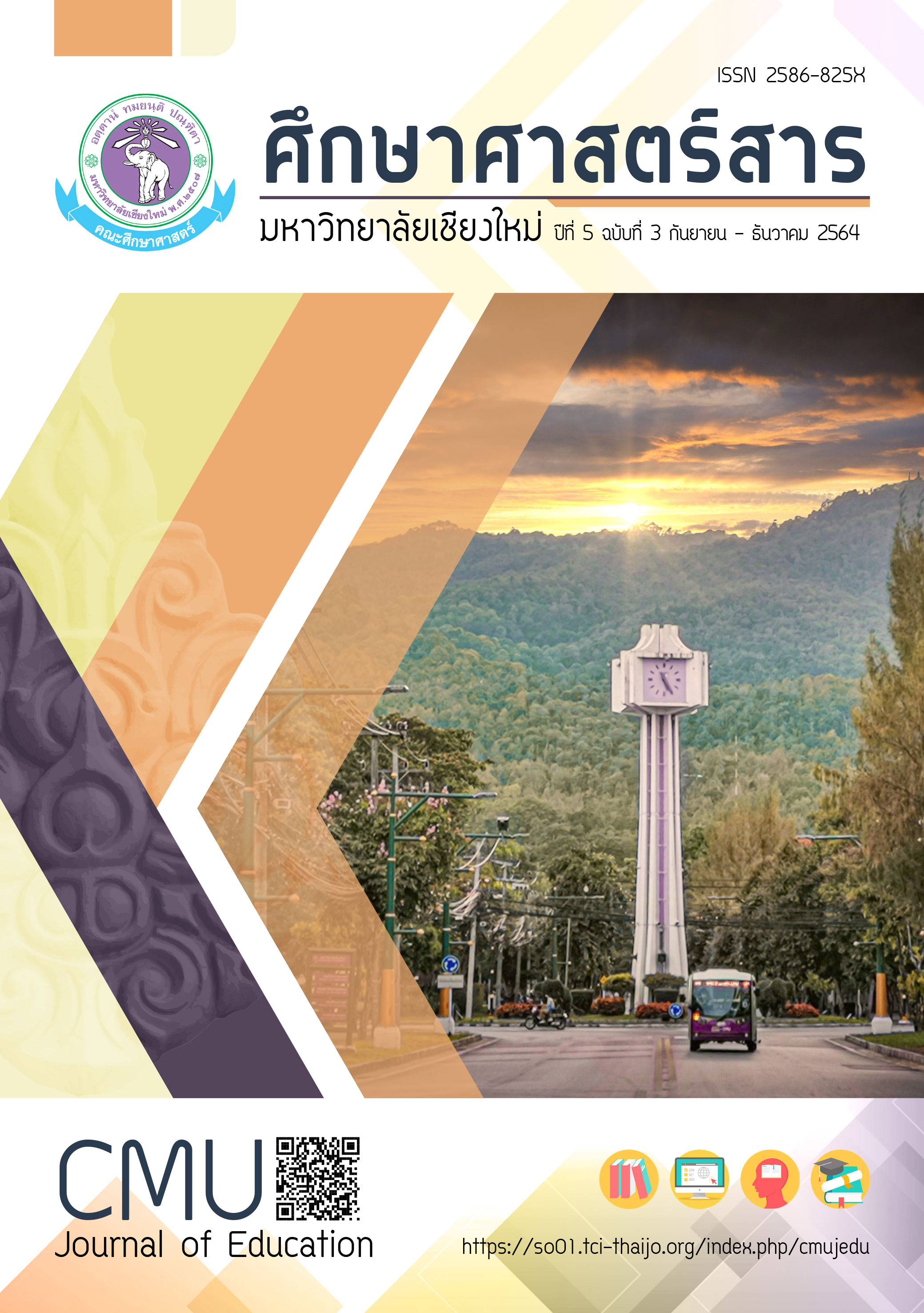แนวคิดเกี่ยวกับการเรียนชีววิทยาของนักเรียนแผนการเรียนวิทยาศาสตร์ระดับชั้นมัธยมศึกษาตอนปลาย
Main Article Content
บทคัดย่อ
งานวิจัยครั้งนี้จึงมีจุดประสงค์เพื่อศึกษาแนวคิดเกี่ยวกับการเรียนชีววิทยาและความสัมพันธ์ระหว่างแนวคิดเกี่ยวกับการเรียนชีววิทยา โดยมีกลุ่มเป้าหมายเป็นนักเรียนชั้นมัธยมศึกษาตอนปลายแผนการเรียนวิทยาศาสตร์ จำนวน 204 คน เครื่องมือที่ใช้ ได้แก่ แบบสอบถามแนวคิดเกี่ยวกับการเรียนชีววิทยา ซึ่งประกอบไปด้วยแนวคิดทั้ง 6 แนวคิด ได้แก่ การจดจำ การสอบ การคำนวณและฝึกปฏิบัติ การเพิ่มพูนความรู้ การประยุกต์ใช้ และการเข้าใจและเห็นมุมมองใหม่ ทำการวิเคราะห์ค่าความเชื่อมั่นและความสัมพันธ์ระหว่างแนวคิด ผลการศึกษาพบว่า นักเรียนมีแนวคิดเกี่ยวกับการเรียนชีววิทยาด้านการจดจำสูงที่สุด (X= 4.162, S.D. = 0.971) รองลงมาคือการเพิ่มพูนความรู้ (X= 4.123, S.D. = 0.874) การเข้าใจและเห็นมุมมองใหม่ (X= 4.021, S.D. = 0.857) การประยุกต์ใช้ (X= 3.790, S.D. = 0.874) การสอบ (X= 3.167, S.D. = 1.267) และการคำนวณและฝึกปฏิบัติ (X= 3.099, S.D. = 1.188) ตามลำดับ ค่าสหสัมพันธ์ระหว่างการสอบและการจดจำมีค่ามากที่สุด (r = 0.628) ในขณะเดียวกันค่าสหสัมพันธ์ระหว่างการจดจำและการเข้าใจและเห็นมุมมองใหม่มีค่าน้อยที่สุด (r = -0.188) เมื่อพิจารณาความสัมพันธ์พบว่า การเพิ่มพูนความรู้ส่งผลทางบวกต่อแนวคิดการเข้าใจและเห็นมุมมองใหม่อย่างมีนัยสำคัญทางสถิติ (p <00.5) จากผลการศึกษาจะเห็นว่านักเรียนมีแนวคิดเกี่ยวกับการเรียนชีววิทยาในด้านการจดจำสูง และมีความสัมพันธ์กันอย่างมากกับการสอบ นอกจากนี้ยังพบว่าแนวคิดเกี่ยวกับการเรียนชีววิทยาในระดับต่ำ เช่น การสอบ การจดจำ มีความสัมพันธ์กัน ทำนองเดียวกันกับแนวคิดเกี่ยวกับการเรียนชีววิทยาในระดับสูงเช่น การเพิ่มพูนความรู้ การเข้าใจและเห็นมุมมองใหม่ มีความสัมพันธ์กันเช่นกัน ดังนั้นในกระบวนการจัดการเรียนรู้วิชาชีววิทยาครูผู้สอนควรจัดกิจกรรมที่ส่งเสริมแนวคิดการเรียนชีววิทยาในระดับสูงและลดกิจกรรมที่ทำให้เกิดแนวคิดการเรียนชีววิทยาในระดับต่ำ
Article Details

อนุญาตภายใต้เงื่อนไข Creative Commons Attribution-NonCommercial-NoDerivatives 4.0 International License.
หากผู้เสนอบทความมีความจำเป็นเร่งด่วนในการตีพิมพ์โปรดส่งลงตีพิมพ์ในวารสารฉบับอื่นแทน โดยกองบรรณาธิการจะไม่รับบทความหากผู้เสนอบทความไม่ปฏิบัติตามเงื่อนไขและขั้นตอนที่กำหนดอย่างเคร่งครัด ข้อมูลของเนื้อหาในบทความถือเป็นลิขสิทธิ์ของ Journal of Inclusive and Innovative Education คณะศึกษาศาสตร์ มหาวิทยาลัยเชียงใหม่
เอกสารอ้างอิง
Boulton-Lewis, G. M., Marton, F., Lewis, D. C., & Wilss, L. A. (2004). A longitudinal study of learning for a group of indigenous Australian university students: Dissonant conceptions and strategies. Higher Education, 47(1), 91-111.
Chiou, G. L., Liang, J. C., & Tsai, C. C. (2012). Undergraduate students’ conceptions of and approaches to learning in biology: A study of their structural models and gender differences. International Journal of Science Education, 34(2), 167-195.
Cimer, A. (2012). What makes biology learning difficult and effective: Students' views. Educational Research and Reviews, 7(3), 61-71.
Duarte, A. M. (2007). Conceptions of learning and approaches to learning in Portuguese students. Higher education, 54(6), 781-794.
Eklund-M, G. (1998). Students’ conceptions of learning in different educational contexts. Higher Education, 35, 299–316.
Hair, J.H., Black, W.C., Babin, B.J, and Anderson, R.E. (2010). Multivariate Data Analysis A Global Perspective (7th ed.). Upper Saddle River (N.J.): Pearson Education Limited.
Hallinger, P., & Kantamara, P. (2001). Exploring the cultural context of school improvement in Thailand. School Effectiveness and School Improvement, 12(4), 385-408.
Hofer, B. K., & Pintrich, P. R. (1997). The development of epistemological theories: Beliefs about knowledge and knowing and their relation to learning. Review of educational research, 67(1), 88-140.
Faikhamta, C. & Ladachart, L. (2016). Science education in Thailand: Moving through crisis to opportunity. In M, Chiu (Ed.). Science education research and practice in Asia (197-214). Singapore: Springer.
Huang, Y. S., & Asghar, A. (2018). Science education reform in Confucian learning cultures: teachers’ perspectives on policy and practice in Taiwan. Cultural Studies of Science Education, 13(1), 101-131.
Field, A. (2000). Discovering statistics using SPSS for windows: Advanced techniques for the beginner. London: Sage.
Kampa, N., Neumann, I., Heitmann, P., & Kremer, K. (2016). Epistemological beliefs in science—a person-centered approach to investigate high school students' profiles. Contemporary Educational Psychology, 46, 81-93.
Koballa Jr, T., Graber, W., Coleman, D. C., & Kemp, A. C. (2000). Prospective gymnasium teachers' conceptions of chemistry learning and teaching. International Journal of Science Education, 22(2), 209-224.
Lee, M. H., Johanson, R. E., & Tsai, C. C. (2008). Exploring Taiwanese high school students’ conceptions of and approaches to learning science through a structural equation modeling analysis. Science Education, 92(2), 191-220.
Lee, S. W. Y., Liang, J. C., & Tsai, C. C. (2016). Do sophisticated epistemic beliefs predict meaningful learning? Findings from a structural equation model of undergraduate biology learning. Internal Journal of Science Education, 38(15), 2327-2345.
Lin, T. C., Liang, J. C., & Tsai, C. C. (2015). Conceptions of memorizing and understanding in learning, and self-efficacy held by university biology majors. International Journal of Science Education, 37(3), 446-468.
Lin, C. L., Tsai, C. C., & Liang, J. C. (2012). An investigation of two profiles within conceptions of learning science: an examination of confirmatory factor analysis. European Journal of Psychology of Education, 27(4), 499-521.
Marshall, D., Summer, M. & Woolnough, B. (1999). Students’ conceptions of learning in an engineering context. Higher Education, 38, 291–309.
Marton, F., Dall’alba, G. & Beaty, E. (1993). Conceptions of learning. International Journal of Educational Research, 19, 277–299.
Marton, F., & Saljo, R. (1976). On qualitative differences in learning—I. Outcome and process. British Journal of Educational Psychology, 46, 4–11.
Marton, F., Watkins, D., & Tang, C. (1997). Discontinuities and continuities in the experience of learning: An interview study of high-school students in Hong Kong. Learning and instruction, 7(1), 21-48.
Purdie, N., Hattie, J., & Douglas, G. (1996). Student conceptions of learning and their use of self-regulated learning strategies: A cross-cultural comparison. Journal of Educational Psychology, 88(1), 1-14.
Saljo, R. (1979). Learning in the Learner’s Perspective 1. Some Commonsense Conceptions Gothenburg. Sweden: Institute of Education,University of Gothenburg.
Stevens, J. (1996). Applied multivariate statistics for the social sciences (3rd ed.). Mahwah, NJ: Lawrence Erlbaum Associates.
Sadi, Ö. (2015). The analysis of high school students' conceptions of learning in different domains. International Journal of Environmental and Science Education, 10(6), 813-827.
Sadi, Ö., & Lee, M. H. (2018). Exploring Taiwanese and Turkish high school students’ conceptions of learning biology. Journal of Biological Education, 52(1), 18-30.
Schneider, B., & Lee, Y. (1990). A model for academic success: The school and home environment of East Asian students. Anthropology & Education Quarterly, 21(4), 358-377.
Shen, K. M., Lee, M. H., Tsai, C. C., & Chang, C. Y. (2016). Undergraduate students’ earth science learning: relationships among conceptions, approaches, and learning self-efficacy in Taiwan. International Journal of Science Education, 38(9), 1527-1547.
Tetlock, P. E. (2003). Thinking the unthinkable: Sacred values and taboo cognitions. Trends in cognitive sciences, 7(7), 320-324.
Trigwell, K., & Ashwin, P. (2006). An exploratory study of situated conceptions of learning and learning environments. Higher Education, 51, 243–258.
Tsai, C. C. (2004). Conceptions of learning science among high school students in Taiwan: A phenomenographic analysis. International Journal of Science Education, 26(14), 1733-1750.
Tsai, C. C., Ho, H. N. J., Liang, J. C., & Lin, H. M. (2011). Scientific epistemic beliefs, conceptions of learning science and self-efficacy of learning science among high school students. Learning and Instruction, 21(6), 757–769.


